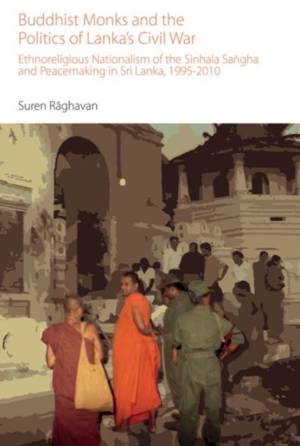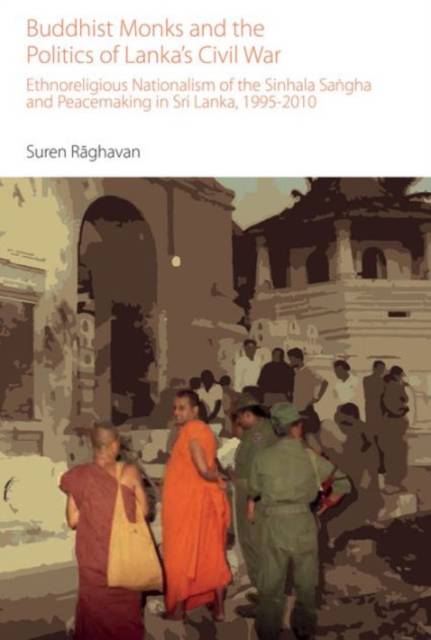
- Afhalen na 1 uur in een winkel met voorraad
- Gratis thuislevering in België vanaf € 30
- Ruim aanbod met 7 miljoen producten
- Afhalen na 1 uur in een winkel met voorraad
- Gratis thuislevering in België vanaf € 30
- Ruim aanbod met 7 miljoen producten
Zoeken
Buddhist Monks and the Politics of Lanka's Civil War
Ethnoreligious Nationalism of the Sinhala Sangha and Peacemaking in Sri Lanka, 1995-2010
Raghavan
€ 177,45
+ 354 punten
Omschrijving
The war in Sri Lanka was violent and costly in human and material terms. This was one of the longest wars in modern South Asia. Often referred to as an 'ethnic' conflict between the majority Sinhalas and the minority Tamils, the war had a profound religious dimension. The majority of Sinhala Buddhist monks (the Sangha) not only opposed any meaningful powersharing but latterly advocated an all-out military solution. Such a nexus between Buddhism and violence is paradoxical; nevertheless it has a historical continuity. In 2009 when the war ended amid serious questions of war crimes and crimes against humanity, monks defended the military and its Buddhist leadership. Taking the lives of three key Sangha activists as the modern framework of a Sinhala Buddhist worldview, this book examines the limitations of Western theories of peacebuilding and such solutions as federalism and multinationalism. It analyzes Sinhala Buddhist ethnoreligious nationalism and argues for the urgent need to engage Buddhist politics - in Lanka and elsewhere - with approaches and mechanisms that accommodate the Sangha as key actors in political reform. Sinhala Buddhism is often studied from a sociological or anthropological standpoint. This book fills a gap by examining the faith and practice of the Sinhala Sangha and their followers from a political science perspective.
Specificaties
Betrokkenen
- Auteur(s):
- Uitgeverij:
Inhoud
- Aantal bladzijden:
- 294
- Taal:
- Engels
- Reeks:
Eigenschappen
- Productcode (EAN):
- 9781781790786
- Verschijningsdatum:
- 1/10/2015
- Uitvoering:
- Hardcover
- Formaat:
- Genaaid
- Afmetingen:
- 160 mm x 236 mm
- Gewicht:
- 498 g

Alleen bij Standaard Boekhandel
+ 354 punten op je klantenkaart van Standaard Boekhandel
Beoordelingen
We publiceren alleen reviews die voldoen aan de voorwaarden voor reviews. Bekijk onze voorwaarden voor reviews.











